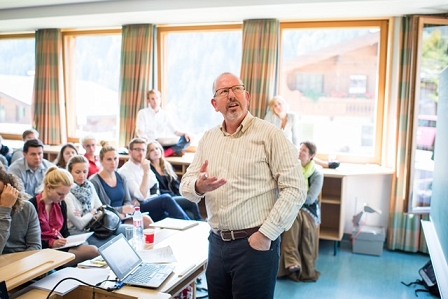Erstellt am: 31. 8. 2015 - 12:59 Uhr
The Domino Effect Of Extreme Weather
Right now our headlines are full of the stories of desperate people attempting to reach Europe because they feel they have been driven from their homelands.
Well don’t expect this story to disappear soon. The violence in Syria is the main push factor right now, but Tim Benton, a renowned ecologist and global food security expert, warns that our warming climate and rising sea levels could have devastating impacts of global stability and will lead to more mass migration.
Benton, who I met at the European Forum in Alpbach, says it’s not just the climate refugees from low-lying countries like Bangladesh or from Vietnam’s sinking rice-basket of the Mekong Delta that we need to worry about. Global warming will bring more and more extreme weather events:
"We’ll have more and more deadly heat waves and more droughts", says Benton "but also more periods of extreme rainfall and floods.”

Philipp Naderer
The consequences will unpredictable food price shocks which will be an immediate danger to the world’s poorest and, because of the interconnected global food markets, will cause further political instability.
"We Will All Feel The Pain"
"Because we all rely so much on global trade, a big shock – say a 5-10% drop in food production in one of the world’s bread-baskets – will send food prices rocketing and we will all feel the pain."
An an example Benton offers the intense heat wave in Russia at the beginning of this decade. The extreme dry heat caused the country's worst drought in 40 years. As a result, the vital Russian grain harvest was decimated and global food prices rose sharply. Benton says the after effects of that shock are still being felt today:
"In rich countries increased food prices are associated with the poor going hungry and the need for more food banks," says Benton, "but when food prices go up in more instable economies it is the most potent way of getting people on the streets. In the initial food riots that started the Arab Spring involved people going out on the streets and waving baguettes saying the government had mismanaged food policy. The French revolution started when food prices went up."
The First Domino
Now clearly this is just one of many factors that led to today's instability. We could spend days debating the causes of security meltdown across the Mediterranean. We have to factor in the intransigence of brutal authoritarian governments clinging desperately to power and clashing with a young internet-savvy generation's fresh aspirations of freedom. We'd have to factor in frustration with joblessness and resurgence of intolerant Islamist forces, as well as misguided Western foreign politics. There was no simplistic single cause.
But Benton's point is extreme-weather food insecurity might have been the first domino to fall; the direct line that leads from the heat fires in Russia's grain-belt to the groups of desperate refugees on the Hungarian border: "If we didn’t have that food price spike in 2010/11 driven by a very hot year in Russia and Ukraine, would we have had the North African food riots, leading to the Arab Spring then Libya and Syria, leading to the rise of IS in a power vacuum and leading to the migrant crisis?"
It is, as Benton acknowledges, an unanswerable question to answer. Yet it is worth thinking about. Benton was part of a research team of US and UK scientist who released a report this summer estimating that from 2070 onward, such severe shock could be happen in seven out of ten years.
In other words, in the not very distant future there will be more crisis years than years where there is no crisis.
But when word leaders gather in Paris in December for the UN Climate Change Summit, they should factor in the security threat of failing to take appropriate action.


